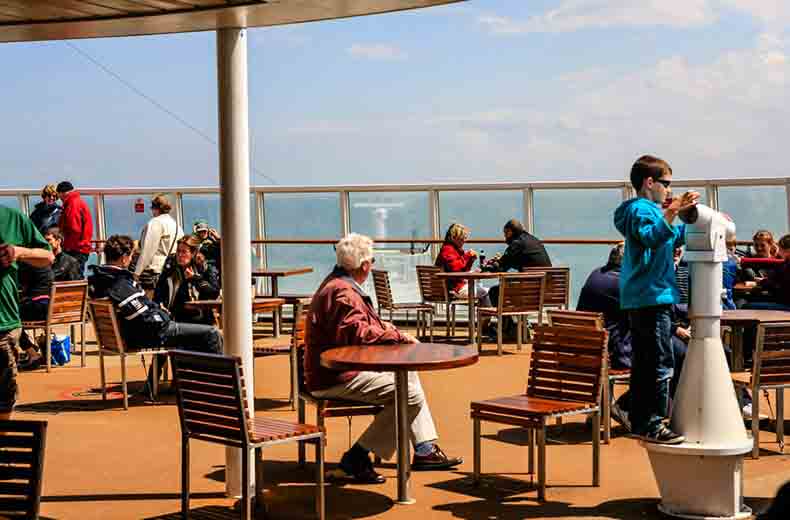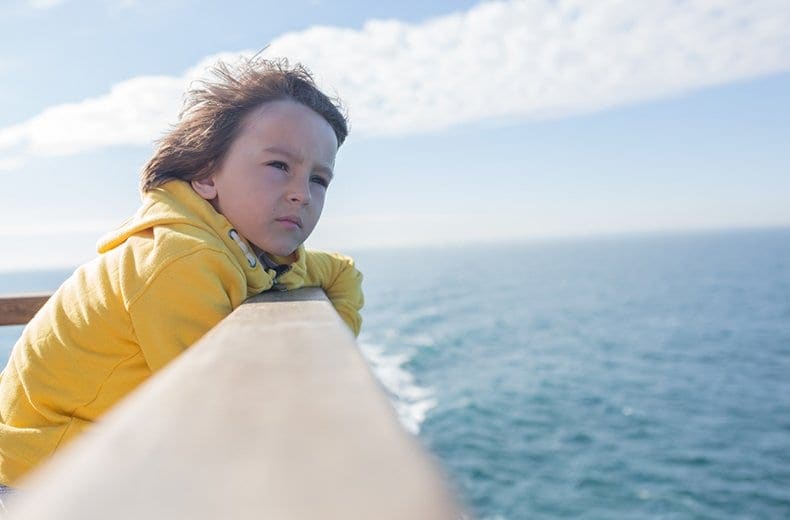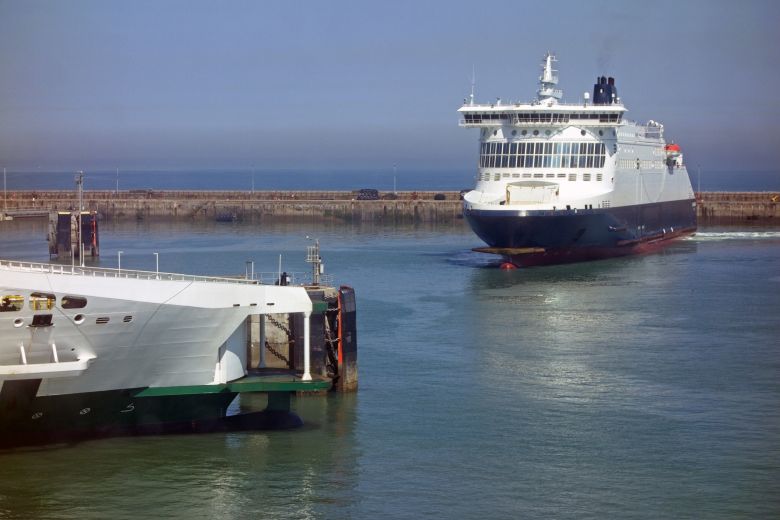Many of us start these excursions with a cross Channel ferry – so what are these services and what do you need to remember before you drive on-board?
To help you prepare for your crossing, here’s our guide to everything you need to know about cross Channel ferries.
Can I drive to France?
Yes, and there’s a bit of choice when it comes to how to do it. Some motorists will opt for the Channel Tunnel, but many see the cross-Channel ferry as a cheaper and more family-friendly alternative on the open seas.
If you’ve already decided on a ferry, read on for some helpful tips and access information.
If you're looking to drive to France, you may want to look at taking out European Breakdown Cover with the RAC, which can cover you for either a short trip or for the entire year. We also offer temporary car insurance if you're borrowing a car for the drive over.
Cross Channel ferry routes
Cross-Channel ferry routes run from five ports along the south coast of England, connecting the UK with France and Spain:
Ferry from Dover to Calais, France
The quickest and most direct cross-Channel ferry route is Dover to Calais, taking around 1 and a half hours.
Dover is the world’s busiest passenger port, and with millions of travellers passing through every year, surrounding roads can get extremely busy so leave yourself plenty of time to get there. The port is well signposted from the A2.
Ferry from Dover to Dunkirk, France
There are also daily sailings leaving Dover for Dunkirk, further up the French coast. This could be a better option for drivers heading to Bruges, Ghent, Antwerp, Rotterdam or Amsterdam.
Ferry from Newhaven to Dieppe, France
The only ferry connections to the fishing town of Dieppe on the Normandy coast depart from Newhaven in East Sussex, with a few sailings a day and a journey time of around 4 hours.
Located on the eastern banks of the River Ouse, Newhaven port is easily accessed from the A26. It’s significantly smaller than other, busier ports so you may want to stock up on supplies before you reach the port itself.
Ferry from Portsmouth to Caen, France
One of the UK’s best-connected ports, Portsmouth has a wealth of ferry routes to mainland Europe, as well as services to the Isle of Wight, Guernsey and Jersey.
The French routes are great options for those heading to Paris and the Bay of Biscay, sailing into Caen on multiple weekly sailings taking 5 hours and 45 minutes. Don’t forget to check out the Bayeux Tapestry in nearby Bayeux.
Portsmouth’s passenger terminal is located on the city’s Portsea Island and easily accessed at the southern end of the M275. However, with so many services leaving the port, the area can get busy with passengers, so arrive early.
Ferry from Portsmouth to Cherbourg, France
Drivers can get a ferry to Cherbourg (or Cherbourg-Octeville as it’s now known) which takes around 3 hours.
Now we know that the white cliffs of Dover take some beating, but just a short drive up the D901 from Cherbourg you can find the Nez de Jobourg, some of the highest and most dramatic cliffs in continental Europe.
Ferry from Portsmouth to St Malo, France
Ferries to St Malo happen a few times every week and they each take approximately 11 hours.
Head East from here and you’ll find one of France’s most iconic sights: Mont Saint-Michel. Make sure the tides don’t prevent you from crossing over to this middle-ages time capsule during your trip!
- The best places to stop and visit on a European road trip
- The Tour de France guide – the route, dates and how to plan your road trip
- How to pack for a road trip
Ferry from Portsmouth to Le Havre, France
Cross Channel ferries run to Le Havre on several weekly sailings, each with a 5 and a half hour journey.
Le Havre is the second port of France after Marseille. It has a fast-growing tourist trade based on the yachting harbour and the adjacent resort of Sainte-Adresse, where Claude Monet once spent a summer painting 2 leisure scenes.
Ferry from Portsmouth to Bilbao, Spain
There are also ferry routes from Portsmouth to northern Spain, with weekly services to Bilbao taking 23 and a half hours. Cabins are available on these longer routes.
Bilbao is the de facto capital of the Basque Country, known for its stunning architecture, lush green hills, vibrant cultural history and delicious cuisine. Don’t forget to pick up some pintxos (big tapas) while you’re in town.
Ferry from Portsmouth to Santander, Spain
A further weekly service run from Portsmouth to Santander also takes 23 and a half hours.
There are many beautiful golden beaches, a gorgeous palace on the Magdalena peninsula and all the freshly caught Cantabrian seafood you can eat: so make sure you have time to enjoy Santander once you drive off the boat.
Ferry from Poole to Cherbourg, France
Another connection to the Normandy port of Cherbourg runs from Poole, with up to 10 sailings a week leaving the Dorset port, each taking around 4 hours and 15 minutes.
The port is accessed via the A350, which can get busy at peak times as it passes through central Poole. The port itself has decent facilities, although you may wish to stock up elsewhere before boarding the ferry.
Ferry from Plymouth to Roscoff, France
The final port offering cross-Channel ferry services is Plymouth in Devon. While for some drivers Plymouth will be more convenient, do be warned that for others it’ll add a significant amount of time to your journey on the UK side of the Channel.
There are multiple sailings a week to Roscoff, a port town in north west Brittany, with journeys taking 5 and a half hours. Roscoff is known for its picturesque architecture as well as for being a departure point for the iconic ‘Onion Johnnies’: cycling onion traders.
Ferry from Plymouth to Santander, Spain
Drivers in the southwest heading to Spain might want to opt for Plymouth instead. There’s a weekly service to Santander which, at 19 and a half hours, is quicker than the Portsmouth option.

Instant cover available
• 24/7 rescue at the roadside
• Help to get home if your vehicle can't be fixed
• 5 star Defaqto rated cover

How long before departure time should I arrive at the ferry port?
Aim to arrive at the ferry port around an hour before departure to make sure you have enough time to check-in and pick up any last-minute essentials.
However, during peak season you can expect ports to be busier, so always check your route to the port beforehand to avoid queues and any other delays you might encounter on your way there.
How much is a cross Channel ferry?
That depends on which ferry you’re planning to take – the longer the route the greater the cost – so always check with operators for up-to-the-minute prices.
Keep an eye out for special offers on certain routes and be aware that sailings outside peak hours (such as in the middle of the night) are often a lot cheaper.
How long does a cross Channel ferry take?
A Dover to Calais crossing takes around 1 and a half hours whereas the Portsmouth to Santander ferry will take almost 24 hours, so bear this in mind when planning your trip.
What facilities are on board a cross Channel ferry?

Ferries on shorter routes will have restaurants, shops and bars as well as toilet and changing facilities and rest areas. On longer routes, some ferries even have cinemas and swimming pools to keep passengers entertained.
On these longer routes, you may prefer to book a cabin so that you can get privacy and some decent kip on your journey. These cabins include beds and en-suite bathrooms, with family and pet-friendly versions available. Ideal for keeping everyone happy on the high seas.
Can I take food and drink on a ferry?
Yes, you can. Although food and drink is readily available on board, passengers are able to bring their own food on the ferry and enjoy a picnic on the waves.
Be aware that most ferry operators don’t allow passengers to bring alcohol on board so check ahead if you’re planning on buying alcohol on mainland Europe. You will be able to buy alcohol at the on-board bar.
Can I take a caravan on a ferry?
Most ferries will allow you to bring your caravan on board, but always check with the operator beforehand to prevent disappointment when you arrive at the port. There are usually some limitations when it comes to size and weight.
Is a cross Channel ferry suitable for kids?

Yes. Many parents actually prefer to take a ferry because they see it as more child-friendly than the Channel Tunnel, with some ferry operators running children’s activities and entertainment, particularly on the longer routes.
Even without these added extras, ferries are great at breaking up long car journeys, giving kids the chance to burn some energy. You can also fill up on food and drink easily, and some ferries will have soft play areas or cinemas if the kids get bored of the novelty of being at sea.
What should I take on the ferry?
All ferries, even the shorter Dover-Calais routes, have shops on board where you’ll be able to pick up essentials and they all have restaurants and cafes should you want to enjoy a meal.
Be aware that shops and restaurants on board will be more expensive than those on dry land and may not stock everything, so take precautions and take any must-haves with you, including medication and sea sickness pills.
Buy a European Driving Kit from £25.99
Don’t get stung with fines abroad for not having a European Driving Kit
- The best European motoring events in 2019
- The ultimate survival guide for road trips with kids
- Driving in the EU in the event of a no-deal Brexit – everything you need to know
What do I need to remember before I start my road trip?
Before heading off on any long journey, it’s always important to carry out some essential maintenance checks at home to make sure your car is in tip-top condition and you’ll get to your destination and back safely.
The RAC encourages drivers to remember the acronym ‘FORCES’ when carrying out car checks: Fuel, Oil, Rubber, Coolant, Electrics, and Screenwash. Check our tips for avoiding a breakdown for more information on FORCES.
You should also remember to take along a few road trip essentials for the journey; including a first aid kit, additional engine oil/water, mobile phone charger, snacks and games, especially if you’re travelling with children.
Do I need European breakdown cover to drive in Europe?
Nobody wants a breakdown to ruin their day, much less their whole holiday. Wherever you’re heading across Europe, RAC has great value European breakdown cover options that give you comprehensive cover if you break down on your way, offering roadside assistance and a 24/7 English-speaking helpline.
What happens if I break down abroad?
Depending on the level of your European breakdown cover, the RAC will pay towards any garage labour costs, onward travel expenses and accommodation fees – something to consider if you’ve got a booking to make.
To find out everything you need to know about breaking down on the continent, and to get the right quote that meets your needs, check out our complete guide to RAC European breakdown cover.

Instant cover available
• 24/7 rescue at the roadside
• Help to get home if your vehicle can't be fixed
• 5 star Defaqto rated cover











